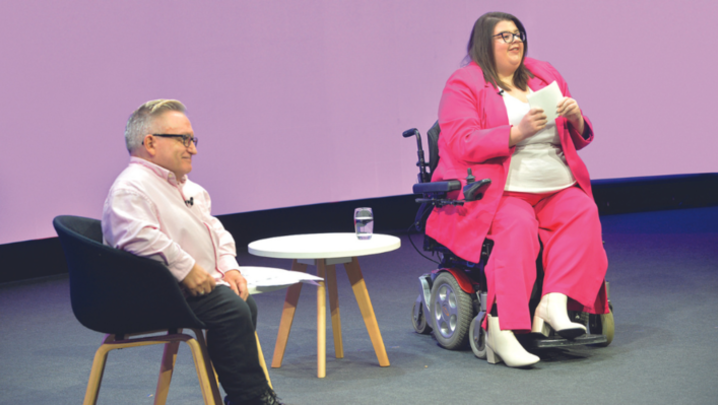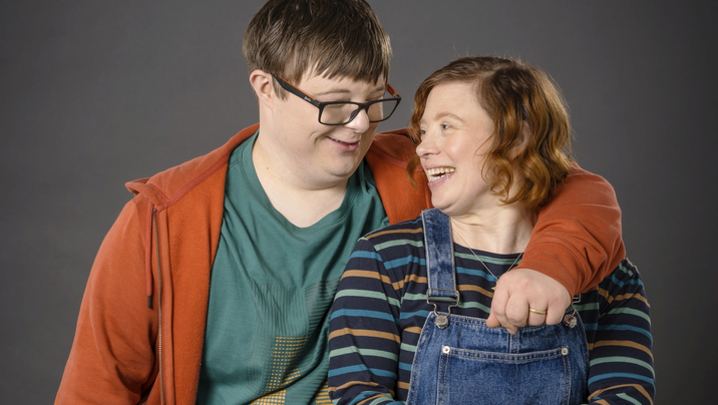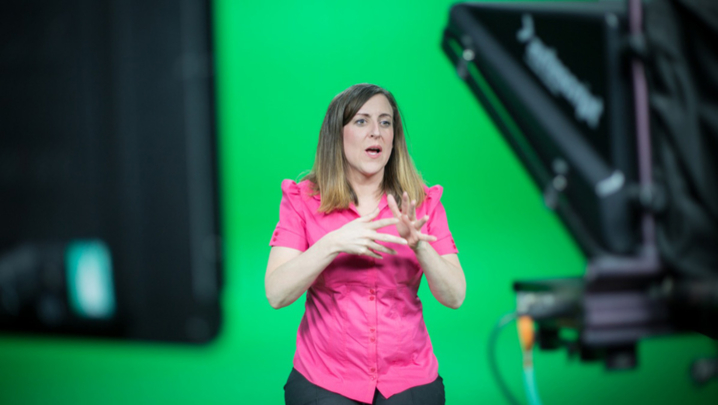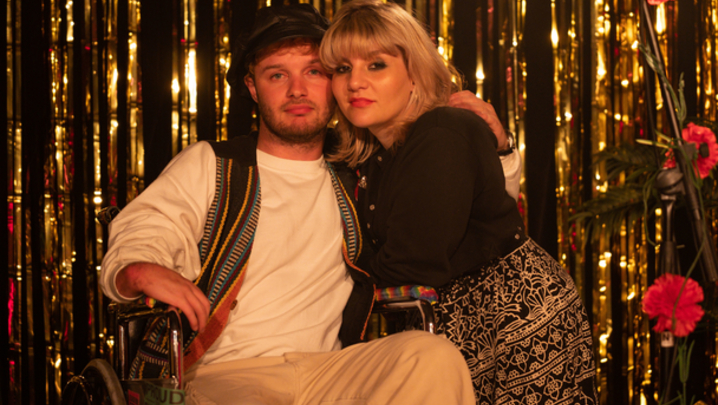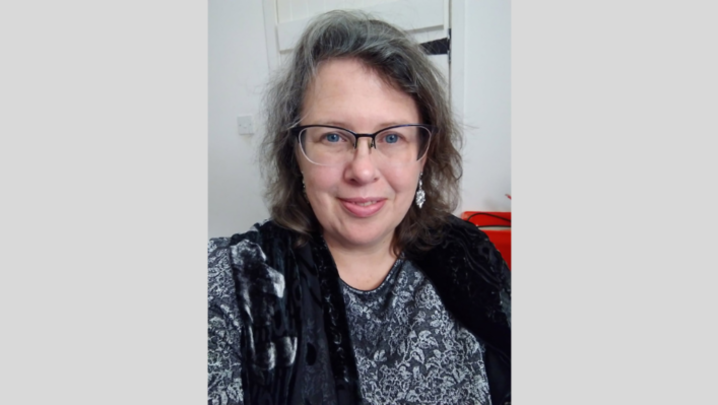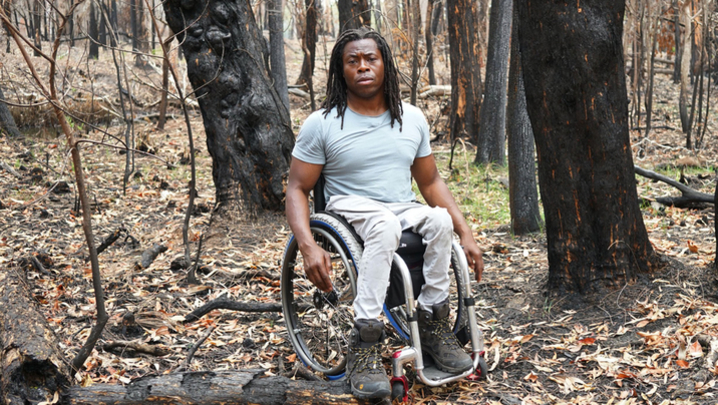Disabled people are the most under-represented in TV. What will it take to improve representation and inclusion?
Screenwriter Jack Thorne’s deeply affecting MacTaggart lecture in August left the UK TV industry painfully aware of its failings over the employment and representation of disabled people. The RTS Cambridge session “Twenty per cent” – the proportion of the UK population who are disabled – was therefore particularly timely.
Referring to calculations by the Creative Diversity Network, based on the broadcasters’ stated targets, Thorne said it would take until 2041 for TV’s disabled workforce to reflect the make-up of the UK. Until then, disabled people faced barriers, disadvantages and ill treatment on a systemic basis in the UK TV sector.
According to the Sir Lenny Henry Centre for Media Diversity, eight in 10 disabled people in the TV industry said their careers had been adversely affected because of their disability. One in two found practical issues, such as their inability to drive or use certain equipment, a barrier to their progression.
This highly charged Cambridge session conveyed the experience of what it was like being a disabled person in TV, and suggested ways to improve the situation. Chair Sinéad Burke, founder of the disability consultancy Tilting the Lens, questioned why it took a lecture by Thorne – who has a lived experience of disability, but does not identify as disabled – for the industry to listen.

“I applaud and admire Jack and I’m grateful to him, but what does it say about this industry that you make commitments and find resources not when disabled creatives speak about the challenges, but when someone speaks about our challenges for us,” she wondered. “What hope is there that the pathways you are building are truly accessible and equitable? Why would we apply when the invitation was crafted about us and for us, not with us? We need to rebuild.”
Panellist Alicia Dalrymple, a junior production manager, discussed the negative consequences of exhausting work schedules imposed with little concern about wellbeing. “Unfortunately, I’ve been in companies where wellbeing in production wasn’t filtered down through management, which took a toll on the whole production, and not just on me with my disability,” she said.
David Proud, an actor, writer and director who has worked on EastEnders, Coronation Street and Marcella, recalled his experience as a wheelchair user. “Only this year, I started talking about the things I’ve had to go through, like crawling to toilets on set, and naked auditions so they can see my scars.
“I’ve never talked about it, because I didn’t want to be trouble. I think every disabled artist out there carries this baggage. And I’m considered one of the lucky ones in terms of a career, so I dread to think what people who haven’t been so lucky have experienced.”
Briony May Williams, who came to national attention as a contestant in The Great British Bake Off in 2018 and now co-presents Food Unwrapped, highlighted the power of TV in reflecting the disabled experience. “Growing up, I never identified as disabled. I was born in 1984 and it was a dirty, dirty word so my mum wouldn’t use it.

“So when I went on Bake Off and they started talking about me being disabled, I was very uncomfortable. But Bake Off has helped me embrace that term, and embrace my disability, and be proud of it. I was the first disabled person in the Bake Off tent.
“Now, I get messages from people with young children who have hands like mine or missing limbs, saying, ‘I’m so glad you were a part of Bake Off because now I know my kids are going to be OK’. It’s so powerful. Now I say, ‘Yeah, I am disabled’. I’m proud of it, and it doesn’t have to be a dirty word.”
While having on-screen representation not only helps to foster empathy and understanding, it also helps “so that those children who are marginalised and othered feel that they belong,” said Burke.
While there was clear merit in listening to those affected by visible and invisible disabilities, Proud pointed out that the onus should not be on disabled people to advocate for equality.
For him, “it’s an energy thing. I have enough energy to do the job that I’m trying to do – not fight to get the job, and then do the job.
“It’s an unfair burden on disabled artists to have to educate people while they’re also working. That burden isn’t there for non-disabled artists, it should not be there for us.”
Burke said that, as a society, we had become very good at asking people questions in some domains: “We do really well in asking people if they’re vegetarian or vegan, and we accommodate for those things.
“Why do we not ask – not just disabled people but everyone around – if they have any access requirements? We need to become comfortable because, if the onus is always on disabled people to ask for what we need, the gesture is charitable rather than rooted in rights.”
A comprehensive approach was required, said Burke: “Accessibility must be embedded in our digital tools, our hiring practices, and our corporate office refurbishments, in our production budgets, and in our marketing strategies.
“We should not have an awards ceremony celebrating the best of British film and television in a building that is inaccessible, or photographs that are taken at the top of a flight of stairs. We should have deaf interpreters on stage with actors and directors, and a ramp to the podium that can be used by everyone.
“It is too late to think about accessibility when disabled talent has already reached the overall echelons of the industry, because who didn’t make it due to the systemic barriers that we created?”
For all under-represented groups, positive discrimination was a helpful but imperfect solution as it was an end-stage fix for a broken system, she added. Early intervention required more resources and took longer to see results, but it could solve the problem at the roots.

“In my quest for inclusion, I’m not asking you to place disabled people in roles that they are unqualified for,” Burke told the Convention. “I’m asking you to acknowledge that the merit system by which we measure success is not designed for everyone to thrive.
“We do not just need programmes that create opportunities for disabled talent, but we need scholarships and bursaries that give access to education, and we need educational campaigns that encourage children and teenagers to believe that this is an industry that they can be a part of.”
Accessibility for the TV-watching public was another area of concern for Burke. On-demand services had provided a helpful platform to expand accessible offerings, and the streamers had been leading the way. “Apple TV+ has excellent audio descriptions. Netflix continues to invest in excellent captioning,” said Burke. “But even with these innovations, non-disabled people are prioritised because accessibility is not automatic, it is hidden in the settings.”
As was so often the case, making content accessible wasn’t only for the benefit of disabled audiences, Burke argued. It also allowed greater flexibility for everyone, potentially increasing a programme’s popularity. Captioning content, for example, enabled a show to be followed in a noisy room, or on public transport even when the viewer had forgotten their headphones.
It was also a more tenable option for those without English as a first language. Similarly, accounting for mental health needs helped those with permanent impairments as well as those suffering from temporary problems. Many who live with insomnia or stress fell into these categories, as did those whose mental health had been affected by Covid.
To make a lasting impact, Proud said that appointing disabled people to senior positions would have the most impact. “I honestly think that, without that, nothing will change,” he said. “Trickle-down economics arguably doesn’t work, but trickle-down diversity does.”
He asked that commissioners who turned down a disabled-led project should consider their reasons carefully. “I know it’s a taste thing and I know you don’t like accountability, but even just having your colleague check it all and go, ‘Would I make that same decision?’, could challenge your perceptions on how you feel about the project.”
Change appears to be on the horizon. After Thorne laid down the gauntlet, the BBC and Netflix announced a five-year UK initiative to co-produce shows involving more on- and off-screen disabled talent.
And across RTS Cambridge, improving accessibility was a hot topic – for example, in her session, Dana Strong, CEO of Sky, highlighted Sky’s involvement as a pathfinder in The Valuable 500 organisation.
In her closing comments, Burke, who wanted to know why so few people had bothered to attend this session, explained in no uncertain terms that the onus was on each individual to become conscious of their contribution. “Be a force for change,” she said. “Arm yourself with two questions. Is this accessible? And who is not in the room? Because those questions free us from the passivity that we feel.”
The invisible disabilities
The disadvantages that come with having a physical disability are also present for those with a mental disability – and, because it’s invisible, they can often be more insidious.
Being mindful of mental health is relevant to those with temporary or permanent mental disabilities, as well as those with physical disabilities whose wellbeing suffers as a result.
‘Everyone thinks about disability, and they’re all obsessed with physical health. My mental health has suffered more during my 15 years [in the industry] than my physical health,’ said David Proud.
Alicia Dalrymple advocates for wellbeing within television production. Existing initiatives include mental health first-aiders and companies that offer external counselling, ‘but even the access to external counselling is not as easy as you’d think it would be’, she said.
Her solutions were to remove barriers so that anyone who needed counselling to do their job effectively could access it, and, critically, to make sure that leadership filtered down the importance of wellbeing at work.
Practical solutions also helped. ‘There might be instances where you have anxiety or sensory overload, and [the affected person] might have to take a breather, and sometimes it’s even about knowing that a room is accessible for someone to do that.’
She continued: ‘It can happen to anyone. A lot of people during Covid have said how much they haven’t coped; it’s also people who live with that their entire lives. And 55% of people in film and TV have contemplated suicide. So it needs to be filtered down. There’s nothing wrong with having a work/life balance.’
Session Sixteen: ‘Twenty per cent’. The panellists were: Alicia Dalrymple, junior production manager; David Proud, actor, writer and director; and Briony May Williams, presenter. It was chaired by Sinéad Burke, founder and CEO, Tilting the Lens, and produced by Sam Tatlow and Chris Ward. Report by Shilpa Ganatra.


